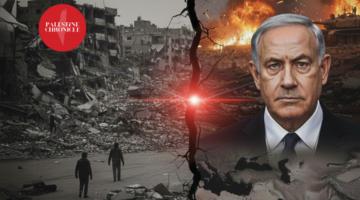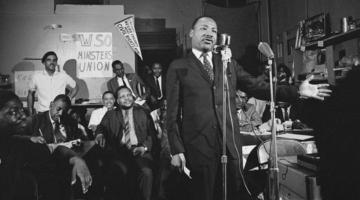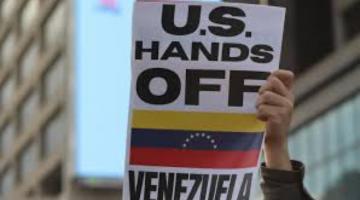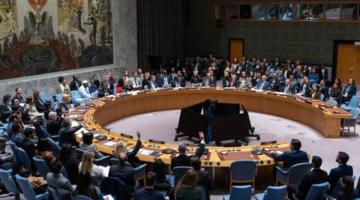Cedric Robinson's Black Marxism can be used as a tool to further expand our understanding of Israel's settler colonial domination over Palestine.
‘This war is a war that is not only between Israel and Hamas. It’s a war that is intended⎯really, truly⎯to save western civilization, to save the values of western civilization.’
Isaac Herzog, President of Israel, CNN, December 2023[1]
No number of Palestinian deaths will be too big for Israel, Joe Biden, Marine Le Pen, the entire German state and almost all its intelligentsia, or The Jewish Chronicle. Writing in that newspaper, the British far-right ideologue, Douglas Murray, made this plain: ‘the civilised world should seek revenge’ and ‘back Israel and back the destruction of Hamas.’ It is right to do so because ‘nothing could surpass the barbarism of what Hamas did’ on October 7;[2] certainly not the murder, at the time of writing, of some 20,000 Palestinian people.
Numbers. What are numbers after all? Abstractions it seems. It is not how many are killed that seems to count, but how they are killed and by whom. Israeli Prime Minister, Netanyahu says what he insists is a war⎯and the West repeats⎯is part of a ‘broader battle between civilization and barbarism.’[3] As Neve Gordon writes, Israel manipulates the international laws of war to portray itself as civilised and its army as humane, for example by warning civilians and telling them to leave before bombarding them, even as it knows there is nowhere for anyone to go.[4] This permits western governments and opinion makers to join in the charade that Israel has a right to self-defence against a terrorist force of unparalleled evil, the lines wilfully blurred between Hamas and the Palestinian population at large. This is familiar terrain for, as Ghassan Kanafani wrote in 1967, ‘the Zionist cause could not justify its conquest of Palestine without leaning on the same justifications of all other conquests throughout history - i.e., by citing physical, civilizational, mental and moral superiority, the other facet of which is how the conqueror directs his gaze at the subjects of his conquest.’[5] The discourse of civilizational supremacy is integral to all colonial endeavours, which constructed a world system for which race was the operating guide.
In the endeavour of making this apparent, of demonstrating the colonial nature of Zionism and its predication on racialism, it is not enough to rely on tried and tested guides. In the face of the extremity of the language being used to justify the murderous attack on Palestine and the open effort to empty Gaza of its residents, we have to reassess the history we reach for as we try, amid our shock, grief and the mental disturbance it daily creates, to find new tools of analysis. Here I am guided by Cedric J. Robinson who wrote in Black Marxism, that in order to develop new theory capacious enough to resurrect ‘events that have systematically been made to vanish from our intellectual consciousness […] we require new history’.[6] Such a new history would reveal ‘the order of things, that is the arrangement of their significances, meanings, and relations.’[7] What this primarily forces me to confront in November 2023 is how we have related to the history of European antisemitism, and how our collective assessments, specifically of the Shoah, impinge upon the Palestinian people and indelibly shape the western, that is to say colonial, world’s response to their attempted genocide.
As the vengeful murder and maiming reached fever pitch, with many Gazans displaced, their homes destroyed, their possessions looted, the rhetoric topped new heights. It’s a drum and a wail, repetitive and desperate in equal measures: ‘Do-you-con-demn-Ham-as’ is the drum. ‘The bloodiest day for Jews since the Holocaust’ is the wail. But this refrain drowns out another register, one which helps us reassess the historical narrative we have been accustomed to. According to that narrative, the Nazi Holocaust is the worst atrocity to ever befall a people. Nazis themselves are synonymous with evil and inhumanity. It is a truism which has served to contain genocidal racism in what is presented as a unique example, suspended outside of history, ensuring, to paraphrase Stuart Hall, that our soothers are well tucked in[8] as we continue to be reassured that this episode of history remains firmly in a past understood in the popular imagination as suspended outside of history, even as it is presented as the one true history of mass victimisation.[9]
It is against this context that we should understand The Jewish Chronicle, founded in 1841, the ‘oldest continuously published Jewish newspaper in the world,’ issuing an article by Douglas Murray that places the Nazis on the side of the civilised. Unlike the barbarians of October 7, the Nazis were ‘rarely proud’ of ‘shooting Jews in the back of the head all day and kicking their bodies into pits.’ They took to drink to forget, unlike Hamas who, like all barbarians, do not drink alcohol. Furthermore, after the war, ‘the Nazis tried to pretend that Treblinka and other death camps never existed,’ alleged proof that they were ashamed of their actions.[10] Murray’s article was followed up by another by a British historian, made a peer by Boris Johnson before his unceremonious exit as Prime Minister in September 2022, Andrew Roberts. According to Roberts, unlike Hamas fighters who attached GoPro cameras to their helmets so they could livestream their atrocities over social media,’ proving that their 7 October attack was carried out in ‘sheer glee,’ the Nazis hid their enactment of genocide from the world. The Nazis apparently ‘did not want evidence of their crimes to be uncovered’ because, contrary to Hamas, they understood them to be immoral.[11] There is no way to disentangle the Nazi-Hamas comparison from global Islamophobia and anti-Arab racism as a major linchpin of the current racial regime. But as the @protosemite X account makes clear, ‘Zionist holocaust denial did not arise out of a vacuum and the argument that Hamas is “worse” than the Nazis because the Nazis “had remorse” can only be understood as a product of a much larger colonial orientalist epistemology that both preceded and engendered Nazism.’[12]
Trading in comparisons between degrees of civilisation reveals more about the epistemic grounds for discussion than it does about the crimes themselves. There is no getting round the fact that, for Israel and its most strident supporters, Palestinians deserve their fate. The onslaught on Gaza represents the restoration of order which, in turn, cleanses the perpetrators of their culpability. Josh Myers, writing in relation to Cedric Robinson’s appraisal of Black studies as ‘a critique of western civilization,’ brings our attention to what Robinson called ‘the terms of order.’ He asks, ‘what if disorder is not chaos?’ What if, rather, what we think of as order ⎯‘management, containment, resolution’⎯does not bring about stability and justice, but on the contrary, terror? Myers suggests that the instability of what we are taught to think of as order should push us to perceive ‘a conception of reality that lies outside of this dyad’ of order-disorder.[13] Robinson’s conception of Black study offers us both a critique of order and a vision of life that is not reducible to ‘social or political order,’ that which he termed the Black Radical Tradition. Seeing the world from this perspective not only affords a vision of what freedom could look like, but also sharpens our understanding of what is necessary to get there by exposing the conceptual knots that western political and social theory gets itself into in the effort to justify western power. The apparent extremity of Murray, Roberts or The Jewish Chronicle’s position is better placed in the epistemic context that birthed it, that which accompanies the development and spread of racial capitalism, as Robinson explains it in Black Marxism.[14] That practice of differentiation, that solidifies into racialism, is accompanied by a comparative logic that pushes against relationality and interdependence and rationalises a worldview of kill or be killed, or in other words, white supremacy. That logic reads ‘from the river to the sea’ as ‘the great replacement.’ There is no other way because imagining otherwise is to dismantle European civilisation itself.
Cedric Robinson’s work helps us understand how the rehabilitation of the Nazis has become a by-product, at the very least⎯if not a more permanent discursive feature⎯of Israel’s domination of the Palestinians, currently at an acute stage. Of primary importance is Robinson’s characterisation of the development of race in Europe. Racialism, he explains, ‘was not simply a convention for ordering the relations of European to non-European peoples but has its genesis in the “internal” relations of European peoples.’[15] As they say, ‘the call is coming from within the house’; the particular cultural, political and social developments that came to characterise European civilization are at the root. Second, Robinson emphasises the interrelationship between race, Herrenvolk ideology and nationalism. This helps explain both the expression of Zionism as a branch of European racial-colonialism and the succour it gives to European ethnonationalism which looks to Israel for inspiration in a move of perverse reversal.
Cedric Robinson’s thesis of the roots of race
Robinson grounds the development of race as a mode of thinking and set of practices in the longue durée or what Geraldine Heng refers to as ‘deep time’.[16] This has world historical importance but goes unrecognised due to the investment from across the western political arena in confining race to a particular, much more recent, period and/or to relegate it to human behaviour alone, ignoring its status as a structural relation and a technology of power. Capitalism cannot be understood without an appreciation for the role played by migrant labour for its development, beginning in feudalist times. However, this maps onto a much longer ideological repository going back, as Robinson writes in the 2000 edition preface to Black Marxism, to Aristotle, which makes racialist differentiation a central feature of European civilization, providing the social and historical context for the appearance of capitalism. Due to the spread of capitalism, of which there is no non-racial variant, racialism too is universalised. Thus, practices of racial capitalism are extended and can be participated in even by those from among groups initially subjugated by them. ‘The idea of Europe’ is also necessarily an expansive one, given as Robinson points out, that it is not a ‘realistic project’ but a spiritual one: Christendom.[17] From this viewpoint, today Israel crystallises the possibility for Europe’s ideological and spiritual preservation, or even expansion, especially important at a time of internal rupture. Even Jews, who Europe casts out and whose civilisational character was established in negation of, alongside Muslim and Black people, can be folded into the meaning of Europe, becoming its very apotheosis. Indeed, this was the explicit aim of Zionists such as Theodor Herzl who envisaged that a Jewish state in Palestine would ‘form a portion of a rampart of Europe against Asia, an outpost of civilization as opposed to barbarism.’[18]
The fact that Jews and Israel become cemented in this imaginary is all important because, in philosemitically elevating Jewish self-determination as over and above any concern for Palestinian life and land, the logic driving racial capitalism continues to do its work. As Robinson puts it, this logic is found in the ‘tendency of European civilization through capitalism… not to homogenise but to differentiate⎯to exaggerate regional, subcultural, and dialectical differences into racial ones.’ Thus Jews are differentiated along bifurcated lines of allegiance to Zionism, adjudicated by Europeans. If racial capitalism reduces human beings to their function, that same logic is applied in the splitting of Jews up according to their function for the perpetuation of Zionist colonial racial capitalism. Jewishness is stripped of its culture and history, including the history of Europe which led up to and made possible the Holocaust, and collapsed into ethnonationalism in the form of Israel.
Nazi murderousness can thus be made relative to Hamas’ actions on October 7 because in making Jewishness/Israel synonymous with Europe, European antisemitism must be portrayed as having been surpassed by that of Europe’s remaining enemies, signified by the ‘Orient’, as it has always been the case. The de-Orientalising of white Jews, European antisemites having previously located us among the ‘Orientals’, has been fully achieved.
Nationalism
In the immediate aftermath of the 7 October Hamas attacks against Israeli soldiers and civilians, Douglas Murray, deployed to Israel to report. His ‘wartime diary’, among his other many outputs since October 8, is published in The Free Press, a website founded by former New York Times journalist and renowned Zionist, Bari Weiss.[19] In his November 30th missive, he cites the late Italian journalist, Oriana Fallaci from her 1969 book on the Vietnam war, Nothing and Amen. It is not coincidental that Murray chooses Fallaci because they are both virulently Islamophobic. Three of Fallaci’s books written in the mid 2000s, railed against what she called ‘Eurabia’ and described immigration from Muslim countries to Europe as an invasion.[20] Her views, which even in the context of the War on Terror were seen as extreme at the time, are now mainstream, legitimised by the policies of western states and abetted by the acceptance of extremist figures like Douglas Murray as bona fide members of the mainstream media.
Murray’s 2017 book, The Strange Death of Europe, exemplifies the grafting of Europe onto Israel. Israel, for ideologues of European civilization such as Murray and Fallaci, crystallises what Europe was, and should have continued to be had it not been ‘in the process of committing suicide.’[21] On a book promotion tour, when he spoke at the National Conservatism Conference, the organisation founded by the right-wing Israeli, Yoram Hazony, Murray said, ‘In Europe, everything to do with identity, history, patriotism and nationalism is viewed in a suspicious light […] while in Israel, nationalism is viewed as good, and patriotism is good.’[22] Cover from Hazony allowed Murray, speaking at a more recent National Conservatism Conference in London in 2023 to dismiss concerns that national conservativism is too closely resemblant to national socialism when he commented that ‘even if the Third Reich had “mucked up” a bit, there was nothing inherently wrong with nationalism.’[23]
In Black Marxism, Robinson explains how it was the conjoining of the pre-existing ideologies of race and Herrenvolk with nationalism in the nineteenth century that bound the proletariat to national bourgeoisies which were able to use these ‘ideological phantasmagoria’ to marshal together ‘national social forces’ from various groups in society.[24] In German and Italy the ‘compost of violence’ produced by the triad of race, Herrenvolk and nationalism, ‘became known under the name of fascism.’[25] Fascism allowed the bourgeoisie to retain ‘total control of its national society,’ a vehicle for ‘expanding its domination and expropriation to the Third World.’[26] Thus, rather than as is common in European historiography, where fascism is seen as aberrant to the nation-state and separate from colonialism, Black radicals such as George Padmore, C.L.R. James, and W.E.B. Du Bois among others made this entanglement clear. The link between fascism and Zionism was there from the start. In an essay on fascism, published in the same year as Black Marxism, Robinson elaborates on the connections between Italian fascism and European Zionists and Italian Jews, for whom Mussolini was a hero until the late 1930s. Mussolini supported the creation of a Jewish state, claiming, ‘I myself am a Zionist.’[27] His interest was to facilitate his colonial designs by enlisting ‘Jewish communities in Libya and East Africa (Italian Somalia and later Ethiopia) in the “pacification” of colonised populations.’[28] According to Klein, Italian colonialism in Ethiopia was widely supported by Italian Jews who ‘thought that Italy’s pride and reputation depended on its colonial conquests.’[29]
The upsurge of Black international solidarity with Ethiopia, following Italy’s invasion in 1935, was therefore in direct opposition to Zionist interests which were aligned with that of fascist Italy. As Robinson explains, ‘ordinary Black workers,’ for whom Ethiopia represented a cause similar to that of Palestine for the internationalist left today, were mainly left to struggle for Ethiopia alone ‘in the face of a long flirtation with fascism in the American press, and the open support of Mussolini by powerful fractions of capital, elements of the international Zionist movement, proto-Fascist American demagogues like Father Coughlin, and Fascist Italian American groups.’[30]
We can see then that the attachment to Zionism of the European far-right is not a recent occurrence. Although it seems incongruent for a march against antisemitism to be led by far-right leader, Marine Le Pen in France, or to have attracted English defence League founder, Tommy Robinson in London, Robinson leads us to antecedents going back to ‘the mid-1920s, as late as the Italo-Ethiopian War of 1935–1936, and until the very eve of the doctrinal rapprochement between the Italian and German governments.’[31] It is important to remember this even as a central myth of Zionism, deployed with renewed vigour, is that it represents a form of anticolonialist national liberation movement. This is ahistorical. As Rashid Khalidi writes, ‘Israel was established as a European settler colonial project—something none of its early leaders denied—with the indispensable assistance of British imperialism.’[32] This framing also attempts to mask the fact that Israel’s greatest supporters, then and now, are more aligned with fascism and its constitutive ideologies of race, nationalism and Herrenvolk, even as they claim to espouse liberal values, in opposition to an Orient portrayed as illiberal. It also further demonstrates the poverty of the notion that fascism exists in a realm apart from colonialism, as it was the British who ultimately opened the way for Israel’s creation. Having defeated the fascism of Hitler and Mussolini, racial colonial capitalism persists in many forms, including the settler colonisation of Palestine. What Robinson’s analysis of the roots of racial capitalism in Black Marxism permits us to see is the importance of disentangling antisemitism from anti-Zionism, the former being integral to the racialism that undergirds European civilization, the latter being fundamental to its critique.
From this vision of things, it is clear why, for Douglas Murray and his fellow travellers, ‘identity politics’⎯synonymous with any attempt to redress injustice, including that wrought by colonialism⎯has led to national identity in the west becoming ‘a shameful form of belonging.’[33] The epistemology on which the severing of nationalism, colonialism and fascism relies⎯Murray disparages the relationality between the invasion of the Americas and Nazism[34]⎯allows Israel to be cast as an outlier among western nations having not succumbed to what he calls what Pascal Bruckner before him called, ‘the tyranny of guilt’.[35] It is only one step from there to the argument that Hamas is worse than the Nazis, for whom after all Europe has been made to pay manifold in the form of ‘mass immigration.’[36] As Murray writes, revealing his less than impeccable concern for the victims of Nazism, ‘Today’s Europeans expect themselves, long before anybody else raises it, to bear specific historical guilt that comprises not only war guilt and Holocaust guilt, but a whole gamut of preceding guilts.’[37] By making the claim, with the imprimatur of Jewish Zionist newspaper, The Jewish Chronicle, that Hamas has surpassed the Nazis, Murray can drive the final nail into the coffin of European guilt. Israel continues to appeal to a hollowed out memorialisation of the Shoah. However the sole purpose of doing so is the justification of its colonisation of Palestine in general, and the current genocidal onslaught on its people in particular. This releases Europe from the need to prostate itself at the alter of its past crimes, allowing ‘the greatest and most cultured civilisations in history’ to rise again.[38] For Zionist ideologues such as Herzl, Nordau or Ruppin, the rise of a Jewish state meant the destruction of the diaspora Jew whose way of life had brought antisemitism upon him or herself.[39]
Conclusion
There has been a marked tendency, endlessly debated during the years of Donald Trump’s presidency, to question the degree to which fascism can be generalised beyond ‘Europe between the First and Second World Wars.’ [40] This was addressed at an earlier time by Robinson in a talk given in 1990 on the response of Black radical theorists to fascism.[41] Robinson critiques dominant trends in fascism studies, drawing on the historian Hayden White to argue that historians of fascism present a narrow view of what it encompasses because they fail to foreground the fact that the meaning of fascism connects to ‘a specific discursive practiced: namely Western historiography.’[42] This practice is bound up with the story the West tells itself about its own identity. The writing of history in the West is consequently obsessed, not ‘with comprehending past societies but with the tribal desire to order them hierarchically.’[43] Given this, it became imperative for fascism to be theorised as aberrant to ‘the Western geist,’ the West to be constituted as the real hero of the story and the value, ‘individual freedom’ against ‘authoritarian mass movements’ and ‘charismatic leaders.’[44]
In contrast, non-Western peoples identified fascism in a much wider set of oppressive practices⎯‘militarism, imperialism, racialist authoritarianism, choreographed mob violence, millenarian crypto-Christian mysticism, and a nostalgic nationalism’⎯none of which stood outside the habitual any more than did ‘colonialism, the slave trade, and slavery.’[45] Their experiences led them to identify fascism as continuous with the oppressive practices generated in the West and which had become a feature of its civilization. It was thus nonsensical to ‘posit fascism as an inherent national trait or to ascribe it to a particular culture or class.’[46] It is obvious, in the face of this critique, why so much is invested by pro-Zionist ideologues in turning the tables and constituting Hamas as the today’s true fascists. No longer merely aberrant to the West, fascism has left it entirely.
In these circumstances, it is important to conclude by noting that a major impetus for Robinson’s writing of Black Marxism was to remind us that it is not only the legacy of Marxism that is responsible for ‘more attention being given to liberation’s record.’[47] It is more so ‘the present state of the world,’ replete in human misery, that ensures that ‘liberationist movements abound in the real world.’[48] Inevitably, given the predominance of racial capitalism, these movements are led by non-Europeans. Black Marxism avoids centering a critique of Marxism by bringing to the fore the cultural resources that powered these movements of liberation, in particular those led by the people who were torn from Africa following the massification of slavery that fuelled the West’s wealth.
Robinson has been critiqued as unfair for writing that ‘Marx consigned race, gender, culture and history to the dustbin’ due to his glossing over the central role played by slavery in enabling capitalism.[49] However, the choice has often been made to invest in defending Marx rather than following Robinson’s lead when he wrote that his purpose was not to exhaust the subject of Black radicalism as a ‘culture of liberation’, ‘only to suggest it was there.’[50] This has meant that much ‘white left’ analysis remains mired in western interpretations of fascism of the kind Robinson critiques, essentially accepting liberal analyses of its aberrant nature. This has left many disarmed in the face of the charge made by Murray et al. that Hamas trumps Zionism.
The only retort from such an impoverished view that refuses to engage with the rich interpretations of fascism to be found in the Black Radical Tradition is to cast a figure like Murray in the role of provocateur and to counsel he be ignored. This is not only deeply unsatisfactory from an intellectual perspective, but also frightening given the success of projects such as the national conservatism movement of which Murray is an adherent. Given the roots of such a project in the particularity of Zionist nationalism and the close ties between the Israeli regime, the seat of imperial power⎯the US⎯and the growing strength of Christian fundamentalist Zionism, on one bank of the Atlantic, and European nativism on the other, this should worry us in the extreme in the medium term. In the short term, the same neglect is playing no small role in underwriting the genocide of the Palestinians. Halting this by any means necessary must be our most pressing concern.
Alana Lentin is Professor of Cultural and Social Analysis at the School of Humanities & Communication Arts at the Western Sydney University in Australia.
[1] Tweet by @khyamallami, 6 December 2023. https://x.com/KhyamAllami/status/1732165473939161248?s=20
[2] Murray, ‘Why Must Jews Watch Their Backs as London Mobs Cheer?’
[3] ‘Excerpt from PM Netanyahu’s Remarks at the Opening of the Winter Assembly of the 25th Knesset’s Second Session’.
[4] Gordon, ‘The Myth of Israel’s “Most Moral Army” | Israel-Palestine Conflict’.
[5] Kanafani, On Zionist Literature. p. 80.
[6] Robinson, Black Marxism. The Making of the Black Radical Tradition. p. 308.
[7] Robinson. p. 177.
[8] Race, the Floating Signifier.
[9] We have rehearsed the permissibility of disturbing this sanctity by placing the Shoah within history and thinking about it ‘multi-directionally,’ as inseparable from other genocidal projects predicated on racial and colonial logics. Of course, the more recent espousal of the importance of de-exceptionalising the Shoah is playing catch-up with Black thinkers, most famously Aimé Césaire in his reminder that Europeans had previously ‘tolerated Nazism’ when it ‘had been applied only to non-European peoples.’ We should admit that Césaire’s too neat chronology severs time into before and after the Shoah. However, his point that we cannot treat Europe as though it existed on its own planet is well taken. Satnam Virdee extends this by critiquing the tendency of decolonial thinkers, such as Mignolo, to treat the Holocaust as singular in the European context which erases ‘the centuries of European history scarred by religious antisemitism.’ What Césaire and other critics of Eurocentrism force us to question is how the failure to relate events within Europe to those outside also serves to elide ‘anti-Roma racism, and anti-Irish Catholic and anti-Slavic racisms within the European interior.’ Rothberg, Multidirectional Memory. Virdee, ‘The Longue Durée of Racialized Capitalism’. Cesaire, Discourse on Colonialism.
[10] Murray, ‘Why Must Jews Watch Their Backs as London Mobs Cheer?’
[11] Roberts, ‘What Makes Hamas Worse Than the Nazis’.
[12] Tweet by @protosemite 13 November 2023. https://twitter.com/protosemite/status/1723759982888538196
[13] Myers, Of Black Study. p. 141.
[14] Robinson, Black Marxism. The Making of the Black Radical Tradition.
[15] Robinson. p. 2.
[16] Heng, The Invention of Race in the European Middle Ages.
[17] Robinson, Black Marxism. The Making of the Black Radical Tradition. p. 10.
[18] Herzl, The Jewish State: An Attempt At a Modern Solution of the Jewish Question.
[19] Murray, ‘Douglas Murray | The Free Press’.
[20] Talbot, ‘The Agitator’.
[21] Murray, The Strange Death of Europe: Immigration, Identity, Islam. p. 4.
[22] Harkov, ‘Douglas Murray’.
[23] Schneider, ‘Light Among The Nations’.
[24] Robinson, Black Marxism. The Making of the Black Radical Tradition. p. 27.
[25] Robinson. p. 27.
[26] Robinson. p. 28.
[27] Robinson, ‘Fascism and the Intersections of Capitalism, Racialism, and Historical Consciousness’. p. 93.
[28] Robinson. p. 94.
[29] Klein, Italy’s Jews from Emancipation to Fascism. p. 148.
[30] Robinson, ‘Fascism and the Intersections of Capitalism, Racialism, and Historical Consciousness’. p. 105.
[31] Robinson. p. 91.
[32] Khalidi, ‘How the U.S. Has Fueled Israel’s Decades-Long War on Palestinians’.
[33] Murray, The War on the West. p. 6.
[34] Murray, The Strange Death of Europe: Immigration, Identity, Islam.
[35] Murray.
[36] Murray. p. 24.
[37] Murray. p. 111.
[38] Murray. p. 5.
[39] As Herzl put it, ‘the Jewish question exists wherever Jews live in perceptible numbers. Where it does not exist, it is carried by Jews in the course of their migrations.’ Herzl, The Jewish State: An Attempt At a Modern Solution of the Jewish Question.
[40] Robinson, ‘Fascism and the Response of Black Radical Theorists’. p. 150.
[41] Robinson.
[42] Robinson. p. 151.
[43] Robinson. p. 151.
[44] Robinson. p. 152.
[45] Robinson. p. 152.
[46] Robinson. p. 153.
[47] Robinson, Black Marxism. The Making of the Black Radical Tradition. p. xxviii.
[48] Robinson. p. xxviii.
[49] Robinson. p. xxix.
[50] Robinson. p. xxxii.
Bibliography
Cesaire, Aime. Discourse on Colonialism. New York: Monthly Review Press, 2000.
Gordon, Neve. ‘The Myth of Israel’s “Most Moral Army” | Israel-Palestine Conflict’. Al Jazeera, 16 October 2023. https://www.aljazeera.com/opinions/2023/10/16/the-myth-of-israels-most-moral.
GOV.IL. ‘Excerpt from PM Netanyahu’s Remarks at the Opening of the Winter Assembly of the 25th Knesset’s Second Session’. Accessed 5 December 2023. https://www.gov.il/en/departments/news/excerpt-from-pm-netanyahu-s-remarks-at-the-opening-of-the-knesset-s-winter-assembly-16-oct-2023.
Harkov, Lahav. ‘Douglas Murray: Israel Has Better Attitude toward Nationalism than Europe’. The Jerusalem Post | JPost.com, 17 May 2019. https://www.jpost.com/israel-news/douglas-murray-israel-has-healthier-attitude-toward-nationalism-than-europe-589905.
Heng, Geraldine. The Invention of Race in the European Middle Ages. New York, NY: Cambridge University Press, 2018.
Herzl, Theodor. The Jewish State: An Attempt At a Modern Solution of the Jewish Question. London: H. Pordes, 1972.
Kanafani, Ghassan. On Zionist Literature. Translated by Mahmoud Najib. Oxford: Ebb Books, 2022.
Khalidi, Rashid. ‘How the U.S. Has Fueled Israel’s Decades-Long War on Palestinians’. Los Angeles Times, 2 December 2023. https://www.latimes.com/opinion/story/2023-12-02/israel-gaza-palestinian-american-history.
Klein, Shira. Italy’s Jews from Emancipation to Fascism. Cambridge: University Press, 2018.
Murray, Douglas. ‘Douglas Murray | The Free Press’. https://www.thefp.com/, 3 December 2023. https://www.thefp.com/t/douglas-murray.
———. The Strange Death of Europe: Immigration, Identity, Islam. London: Bloomsbury, 2018.
———. The War on the West. First edition. New York, NY: Broadside Books, 2022.
———. ‘Why Must Jews Watch Their Backs as London Mobs Cheer?’ The Jewish Chronicle, 9 November 2023. https://www.thejc.com/lets-talk/why-must-jews-watch-their-backs-as-london-mobs-cheer-ul2b765s.
Myers, Joshua. Of Black Study. London: Pluto Press, 2023.
Race, the Floating Signifier. Media Education Foundation, 1997.
Roberts, Andrew. ‘What Makes Hamas Worse Than the Nazis’. Washington Free Beacon (blog), 24 November 2023. https://freebeacon.com/culture/what-makes-hamas-worse-than-the-nazis/.
Robinson, Cedric J. Black Marxism. The Making of the Black Radical Tradition. London: Zed Books, 1983.
———. ‘Fascism and the Intersections of Capitalism, Racialism, and Historical Consciousness’. In Cedric J. Robinson: On Racial Capitalism, Black Internationalism, and Cultures of Resistance, edited by H. L. T. Quan, 87–109. Pluto Press, 2019. https://doi.org/10.2307/j.ctvr0qs8p.
———. ‘Fascism and the Response of Black Radical Theorists’. In Cedric J. Robinson: On Racial Capitalism, Black Internationalism, and Cultures of Resistance, edited by H. L. T. Quan, 149–59. Londin: Pluto Press, 2019.
Rothberg, Michael. Multidirectional Memory: Remembering the Holocaust in the Age of Decolonization. Cultural Memory in the Present. Stanford, Calif: Stanford University Press, 2009.
Schneider, Suzanne. ‘Light Among The Nations’. Jewish Currents, 2023. https://jewishcurrents.org/light-among-the-nations.
Talbot, Margaret. ‘The Agitator’. The New Yorker, 28 May 2006. https://www.newyorker.com/magazine/2006/06/05/the-agitator.
Virdee, Satnam. ‘The Longue Durée of Racialized Capitalism: A Response to Charlie Post’. RACE.ED (blog), 16 April 2021. https://www.race.ed.ac.uk/the-longue-duree-of-racialized-capitalism-a-response-to-charlie-post/.



















